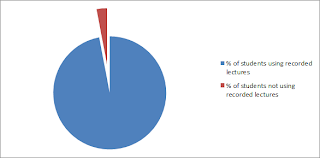One of the most talked about and exciting devices (to be
released 2014) is not the Apple Watch or iPhone 6), it’s the Oculus Rift virtual
reality headset, priced at less than £200, which gives full immersion in a 3D
world. I’ve tried it, here in Starbucks of all places, and several times since,
and it blew my mind. The experience is
so real, so vivid and so memorable that I can remember every last detail weeks
later. This matters in learning, as the trick in simulations is transfer, all
the way back to Thorndike, rarely efficient, except in simulations and in this
case super-efficient.
YouTube has videos showing people freak out when they play horror games with total immersion and 3D sound (watch this guy get freaked out), get their head chopped off by aguillotine in the French Revolution (your head falls into the basket and you
look back at your neck!). It will spawn a new generation of compelling games
but also a new generation of compelling learning experiences.
Learning machine
Vocational learning has lots to gain from this cool device,
as it’s made for learning by doing, real world tasks, not only for acquiring
competences but being assessed for those same competences. The possible
applications come at you in a rush when you’ve tried it..
1. First person thinkers
‘First person shooters’ is the big genre in computer games; Quake,
Doom, Halo, COD – legendary games that sold in their tens of millions. The
immediacy of the experience where split second decisions mean the difference
between life and death make it still the genre of choice for most gamers. Think
now of First Person Thinkers where the player/learner has to make decisions in
response to real word events and I mean human events – management training,
health and safety conflict resolution, you name it….
2. Training within 3D worlds with 3D
instruments
I’ve seen a simulation on domestic house gas inspection that
simulates scenarios so well it’s now used as a large part of the assessment,
saving huge amounts of money in the US. You’re free to move around the house,
check for gas leaks, do all the necessary measurements using the right
equipment – a completely open training and assessment environment. With Oculus
Rift it is far more realistic than a 2D screen showing a 3D simulation.
3. Safe failure
Training that involves experiencing things that would be
impossible to experience in real life as it is likely to result in harm, even
death, can be delivered virtually. Emergency incidents, health and safety,
military operations, medical treatment, surgery – you can be put through
experiences where safe failure is possible just experience an emergency
evacuation from an aircraft once on an Oculus and you’ll never need to listen
to that boring speech again before you take off on an aeroplane,
4. Soft skills
I’ve seen sims that really do train people how to sell,
interview, deal with conflict – even made a few myself - they work. But they’ll
work even better with Oculus, as the level of physical and psychological
fidelity can be finely tuned to the task. Note that this is not all about
physical hi-fidelity. The Oculus, especially the high definition version,
delivers this. It’s the psychological fidelity of being there in the moment
with complete suspension of disbelief. It’s almost impossible not to believe.
5. School curriculum
Experiencing real physics experiments and lab work without
the expense and danger from objects and chemicals is just one set of scientific
learning experiences that can be fully simulated with the Oculus. Get a head
start with live history and walk around a Roman Town populated by Romans
(already exists), a trip across the solar system, into the bloodstream, into a
cell.
6. Attitudinal learning
The intensity of the experience is perfect for affective
learning, where motivation or attitudinal learning is needed. This may be,
values, compliance, ethics, sexual harassment, anything that requires a
head-shift.
7. Assessment
Many competences an only be measured by someone doing
something. Yet most exams come nowhere near measuring competences. This is head
and shoulders above traditional paper exams for many vocational and practical
tasks, real skills. Your performance can really be measured. Your assessment
can be your performance – complete and you’ve passed. This is already a reality
in many simulations, flight sims and so on. It can also be true of many other
skills.
Psychology of learning
In terms of the psychology of learning it hold the attention
of the learner, a necessary condition for learning, rarely achieved for long
periods in lectures and classrooms . You stay on task (almost impossible not
to) providing intense and sustained learning experiences. Safe failure is possible,
taking the learning experiences beyond what can be done in the real world. In terms of memory, these experiences result in
deep processing in memory, increasing effective storage, recall and retention.
Importantly, as this is a huge problem in learning and training, it results in the
superior transfer of skills from the learning experience to their application
in the real world. It is literally a learning machine.
Conclusion
Oculus Rift may remain just a games’ peripheral but I doubt
it. Whenever I’ve got learning professionals to don the headset, they get it immediately – this thing is a turbo-charged,
learning machine. The fact that it’s cheap, open in architecture and will be a
widely available consumer device, gives it the coolness and kudos that will
make it irresistible to anyone who wants learning to be a transformational
experience. All I can say us try it – it will blow your mind.









+Would+you+suggest+parents+to+watch+the+online+lectures.png)
.png)

